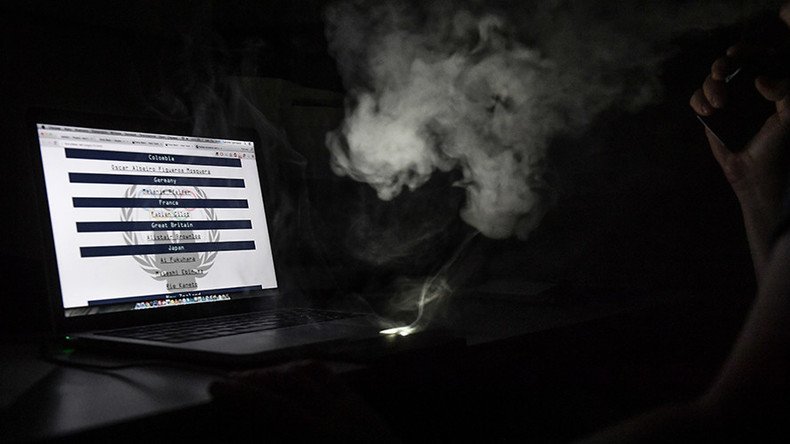In the past year, the world was introduced to a suspect for all seasons and purposes; an interloper so slippery he has yet to be positively identified. Yet, like Sasquatch, Loch Ness and UFOs, we know he is out there, lurking, and laughing at us all.
In dark, smoke-choked rooms across the vast expanse of 11 time-zones that is Putin's Russia are brooding Dostoyevskian characters consumed with one overriding objective: Hacking Hillary Clinton’s email server in a brazen attempt to strike at US democracy and deliver Russia-friendly demagogue Donald J. Trump to power. Yes, Clinton made the task easier by using her home computer to send classified messages, but this should not lessen our appreciation for these provocateurs.
It has been a long and thankless road for the Russian hacker. Whenever he is mentioned, it is in the hushed tones of secret sources behind the closed doors of some windowless government agency, and reported in media of dubious repute. But Russians have to take their fame and notoriety where they can get it these days.
"It is the assessment of the intelligence community that Russia's goal here was to... get Trump elected," an anonymous US official briefed by another anonymous official told the Washington Post. "That's the consensus view."
However, a chorus of skeptical voices questioning this “consensus view” was heard not just in Moscow, but in Washington as well, where officials are demanding some props to support the flimsy Russian hacking script.
Devin Nunes, House Intelligence Committee Chairman, requested a briefing with US intelligence agencies - the FBI, CIA, Office of the Director of National Intelligence and NSA - to update the lawmakers on these explosive findings. Incredibly, all of the agencies declined his request.
The refusal to brief Congress’s most-senior committee was called “unusual” by Fox.
Nunes, flabbergasted by the snub, suggested the failure of the Intel agencies to provide irrefutable evidence of Russian hacking was due to the “manipulation of intelligence” in the quest of particular "political purposes."
Imagine that! US government agencies – and possibly the media as well - working behind the scenes for “political purposes” amid the most hotly contested presidential election in recent memory.
Rep. Peter King, another member of the House Intelligence Committee, sounded a bit like a crazed conspiracy theorist when he told Fox News: “It’s almost as if people in the intelligence community are carrying out a disinformation campaign against the president-elect of the United States…”
But let’s be fair here. Just because there appears to be a lack of forensic evidence to incriminate the Russian hackers, is that any reason to deny them their 15 minutes of fame? Was there any proof that Barack Obama was qualified for the 2009 Nobel Peace Prize, just 11 days after entering office and at the very same time America was bogged down in two wars? No, there wasn’t. But that didn’t stop the Norwegian Committee from bestowing their top prize on America’s first black leader. Nor did it magically turn Obama into a peace-loving president, for that matter.
So why should the Russian hacker be denied a trophy due to a tiny technicality called evidence? Instead of splitting hairs over minor details, we should consider the huge service this unwashed gang of provocateurs rendered to the United States in (the latter's) eternal quest to keep the illusion of democracy alive and kicking.
Had it not been for the sudden emergence of Russian hackers on the US political scene, the American voter would have been needlessly troubled by 20,000 hacked emails from the Democratic National Convention that revealed some rather unsavory things.
For example, how the DNC worked behind the scenes to support Hillary Clinton’s nomination as the Democratic presidential candidate over that of Bernie Sanders, the one guy political analysts say could have given The Donald a run for his money on the rocky road to the White House.
And it gets worse.
In October, yet another batch of freshly leaked emails to Clinton campaign chairman John Podesta showed that interim DNC chairwoman Donna Brazile, who also moonlighted as a CNN contributor, fed debate questions to Clinton that would be asked during a CNN-moderated debate. Here was political intrigue on a scale that made Watergate look like a Saturday afternoon parking ticket by comparison.
And it gets worse still. Much worse.
On July 10, 2016, Seth Rich, 27, Director of Voter Expansion at the DNC, was shot and killed about a block from his home in the Bloomingdale neighborhood of Washington, D.C. Since Rich worked in the voter database division, he would have been privy to DNC’s data materials – including emails. Coincidence? Was his death due to a robbery gone wrong in a shady part of town, as police suggest? Maybe.
Wikileaks founder Julian Assange, in an interview to Dutch television, set off conspiracy alarms when he refused to confirm or deny whether Rich was the WikiLeaks’ source of the DNC emails. But he did announce a $20,000 reward in the young man’s murder case.
Beyond that, the murder of Seth Rich in connection to the leaked/hacked DNC emails has been relegated to the realm of conspiracy theory by the US mainstream media, in favor of their own conspiracy theory that Russian hackers were the real perpetrators.
“There was no indication that any insider was involved in this,” an anonymous source told Newsweek. “Every indication is this was a remote attack from a foreign government—the Russians.
“This is a very sophisticated actor," the nameless source continued. "This is not some kid coming in and downloading documents and handing them to somebody.”
Well, there you have it. Case closed. No possible way that some “kid” with a painful conscience could have been the source of the leaked emails. Much easier to just pin the blame on Russian hackers, who actually had little or nothing to gain from such hijinks.
Perhaps Newsweek should have rung up Henry Kissinger, 93, for his view on the Russian hacker story. They may have been surprised.
When asked on 'Face the Nation' what he made of allegations that the Russians tried to get involved in the US presidential elections, the Washington warhorse said: "I can't quite understand what their purpose would be because in all of the polls Hillary Clinton was far ahead. They could not have had information on the polls that others did not have. And then to antagonize the president-to-be (Clinton) by getting into open support of the opponent doesn't make any sense to me... "
Russian hackers go on European tour
Despite working around the clock wreaking havoc on American democracy, the Russian hacker still found time to rattle Europe, where sold-out leaders are attempting to suppress a slew of homemade crises, including the arrival of millions of undocumented migrants from the Middle East (complete with handsome benefit packages provided by EU taxpayers), painful austerity measures amid a devastating economic downturn, and the continuation of a Russian sanctions regime that is hurting European producers far more than Russian consumers.
Naturally and predictably, such devastating policies strike like an earthquake at the heart of communities, leading to the spectacular rise of far-right political parties, like the National Front in France, Britain’s UKIP and the AfD in Germany. This is by no means political rocket science. So who to blame for this massive grassroots political movement across Europe? Yes, the usual suspects: the Russians and their amazing computer skills.
In fact, some would actually have us believe that Brexit was a Russian hack job.
Labour MP Ben Bradshaw appeared to be auditioning for a stand-up comedy job when he told his peers it is "highly probable" that Russia interfered in the UK’s Brexit referendum.
"I don’t think we have even begun to wake up to what Russia is doing when it comes to cyber warfare,” Bradshaw said without a hint of irony. "Not only their interference, now proven, in the American presidential campaign, [but] probably in our referendum last year. We don’t have the evidence for that yet. But I think it’s highly probable."
Take a moment to reflect upon that last line, because it’s the same line being used as 'proof' of Russian infiltration across the pond in America: “We don’t have the evidence for that yet. But I think it’s highly probable."
Last but not least, Chancellor Angela Merkel added to the insanity, warning in November that Russian hackers may attempt to interfere in Germany’s 2017 general election because, after all, there is no way that Merkel’s politically suicidal decision to allow millions of undocumented migrants into her country could possibly cause her countrymen to lose all faith for this woman.
“We are already, even now, having to deal with information out of Russia or with internet attacks that are of Russian origin or with news which sows false information,” Merkel said, as quoted by Agence France-Presse.
Amazing, isn’t it? At least with Bigfoot and UFOs we are occasionally treated to some grainy photograph that lends some credence to their legends. And although Western leaders risk severe tensions with Moscow over rumors that Russian hackers are disrupting lily-white Western democracies, not a shred of evidence has been provided thus far to substantiate the claims.
So congratulations to the Russian hacker, Person of the Year 2016. Although we never got a chance to formally meet you, or obtain proof that you have done all the incredible things they say you’ve done, that has done nothing to dispel your powerful influence on the world stage.
The statements, views and opinions expressed in this column are solely those of the author and do not necessarily represent those of RT.



